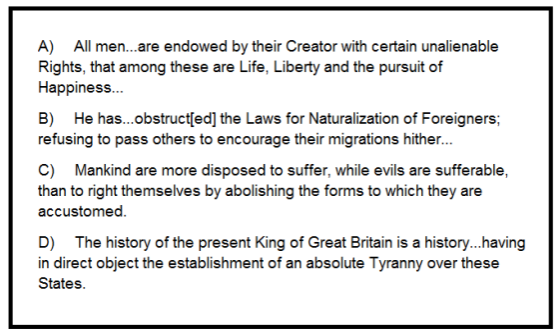Tip
Tap
a student's name
below to see what they need help with29 questions
Q.Which statement reflects the Enlightenment ideas of natural law as expressed by Locke?
1
30 sec
SS.7.C.1.1
Q.What did many American colonists use Thomas Paine's Common Sense to justify?
2
30 sec
SS.7.C.1.2
Q.The Declaration of Independence included these complaints:
• Taxation without representation
• Limiting judicial powers
• Quartering Troops
• Dissolving legislature
Which complaint should be added to this list?
3
30 sec
SS.7.C.1.4
Q.Which of the following was a weakness of the Articles of Confederation?
4
30 sec
SS.7.C.1.5
Q.How did the U.S. Constitution address the problem under the Articles of Confederation that Congress had no power to ensure its laws were followed by the states?
5
30 sec
SS.7.C.1.5
Q.What does the phrase "insure domestic tranquility" in the Preamble of the Constitution
mean?
6
30 sec
SS.7.C.1.6
Q.Which viewpoint was common among Anti-Federalists?
7
30 sec
SS.7.C.1.8
Q.How does rule of law affect U.S. government officials and institutions?
8
30 sec
SS.7.C.1.9
Q.What is a government that is run by the people, either directly or indirectly?
9
30 sec
SS.7.C.3.10
Q.What is the term used in the Fourteenth Amendment to describe persons who are born or naturalized in the United States?
10
30 sec
SS.7.C.2.1
Q.Which situation does NOT involve a right protected by the Bill of Rights?
11
30 sec
SS.7.C.2.4
Q.Peter Brown has lived in his home since he was a child. Now the department of parks and
recreation wants to tear down his neighborhood to build a park. A government official comes to
visit Peter and offers to buy the house from him. Peter refuses. The official says that the
government will now seize the property under the constitutional power of "eminent domain."
According to the U.S. Constitution, under what circumstances would Peter win his fight to keep
his home?
12
30 sec
SS.7.C.2.4
Q.Ben was prosecuted and convicted in state court for speaking out publicly against the
governor. During his trial, he was denied the counsel of a lawyer. Two years later, the U.S.
Supreme Court overturned his conviction, explaining that the state had not guaranteed Ben’s constitutional rights. Which amendments apply to this case?
13
30 sec
SS.7.C.2.5
Q.Anne Tracy works as a journalist for The Daily Mouth. She wrote a story about how Senator Jones cheated on a law school exam. She interviewed witnesses who saw the senator cheating. The story ran on the front page. Senator Jones denied the charges. Then he resigned from office. He plans to sue The Daily Mouth for damages. Under what circumstances could he sue the paper and win his lawsuit?
14
30 sec
SS.7.C.2.5
Q.The constitutional guarantee of a free press has resulted in
15
30 sec
SS.7.C.3.6
Q.A more informed society has resulted from which constitutional protection?
16
30 sec
SS.7.C.3.6
Q.Following the 1966 Supreme Court decision in Miranda v. Arizona, police began informing people placed under arrest that they "have the right to remain silent." What basic freedom is this meant to protect, and how does it affect arrested individuals?
17
30 sec
SS.7.C.3.12
Q.How do modern Democrats and Republicans view taxation?
18
30 sec
SS.7.C.2.8
Q.Flora is concerned because her little brother became ill at school. The doctor explains he has the flu. "I've seen an increase in flu cases among children the past few years," says the doctor. "Many children need flu shots, but their parents can't afford them." Flora decides to take action. Which should be Flora’s final step in attempting to encourage her community to provide low-cost flu shots?
19
30 sec
SS.7.C.2.12
Q.Which example involves changing foreign policy?
20
30 sec
SS.7.C.4.1
Q.Which action illustrates citizen participation in an international organization?
21
30 sec
SS.7.C.4.2
Q.What is the term for a type of government in which one person possesses unlimited power?
22
30 sec
SS.7.C.3.1
Q.Kayla sat in the meeting hall and listened to the different candidates for her state's open
Senate seat. The candidates debated about their positions on issues. When Election Day came along, she voted for the candidate she thought would best serve her community’s interests. What form of government does Kayla have?
23
30 sec
SS.7.C.3.1
Q.Who has the most power in a unitary system?
24
30 sec
SS.7.C.3.2
Q.How are the responsibilities of the legislative and executive branches of government different when it comes to treaties?
25
30 sec
SS.7.C.3.3
Q.Which of the following accurately describes one way an amendment to the U.S. Constitution may be proposed?
26
30 sec
SS.7.C.3.5
Q.Why is a formal amendment process important?
27
30 sec
SS.7.C.3.5
Q.Claude runs a chain of tourist businesses in Florida. He imports T-shirts from Haiti to sell in his stores. One day, student protesters damage several of his shops, demanding that he pay his workers in Haiti a fair wage. Claude estimates the damage at $4,000. Claude sues the protestors for the damage they cause. Where is the original jurisdiction of this case?
28
30 sec
SS.7.C.3.11
Q.Which service is performed by local government?
29
30 sec
SS.7.C.3.14


